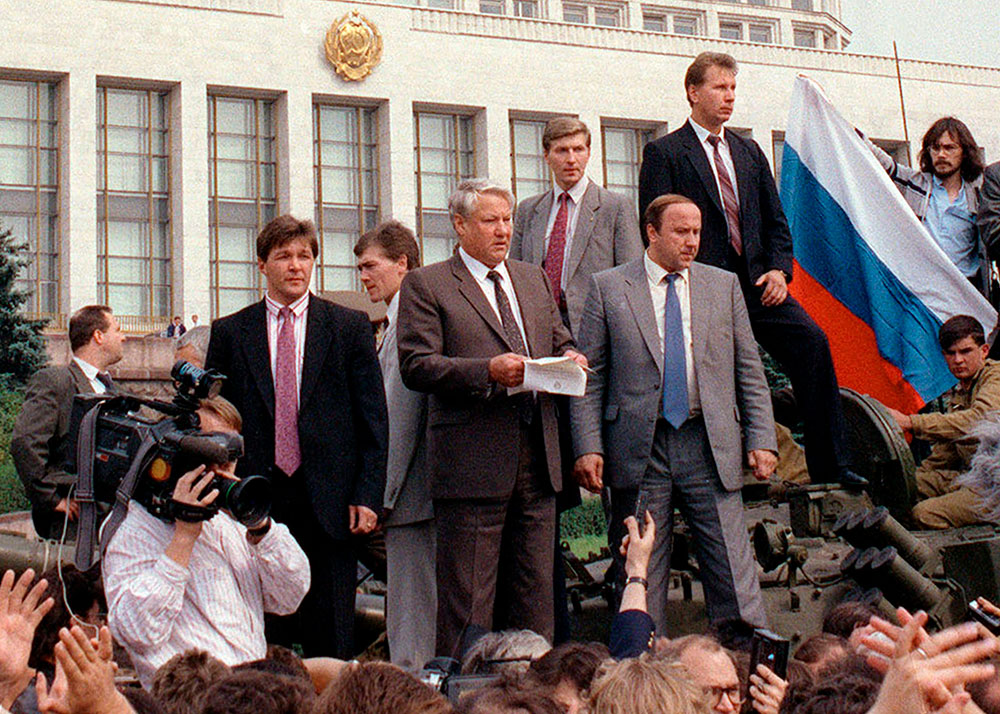Let’s be clear, last week there was an attempted coup d’état in Washington. The success of any sudden, violent, and illegal bid to seize power from a legally established government depends upon the veracity of coup leaders and the reaction of the media and general population. Of far more importance, however, is the only question that really matters. When it all goes down, which way will the army point its guns?
Let’s consider the 1991 attempted coup in Moscow. Early in the morning on August 19, eight extreme right-wing, hard-line communist leaders declared that USSR President Mikhail Gorbachev was ill and that they were assuming power. They pledged to reverse Gorbachev’s reformist policies of Glasnost and Perestroika that were celebrated in the West but were rocking the Soviet economy and, in their eyes, emasculating the state and empire. Coup leaders were ensconced in the Russian Federation State House; a massive building popularly dubbed the White House. They ordered generals to surround the building with soldiers, tanks, and other armoured vehicles to protect them and the building from a rapidly assembling anti-coup crowd. One wrong move, one mistake, one thrown rock or errant shot would spark a massacre.
Then, something astounding happened.
Pro-democracy, pro-capitalism Russian President Boris Yeltsin arrived on the scene at 9:00. With him was Russian Prime Minister Silayev and Soviet Chairman Khasbulatov. They walked to the line and, risking being stopped or shot, clamboured atop a tank. Yeltsin shouted to soldiers and the crowd, something that could have been said in Washington last Wednesday:
“We are dealing with a rightist, reactionary, anti-constitutional coup. Despite all the difficulties and severe trials being experienced by the people, the democratic process in the country is acquiring an increasingly broad sweep and an irreversible character…These developments gave rise to angry reactionary forces, pushed them to irresponsible and adventurist attempts to solve the most complicated political and economic problems by methods of force…We appeal to the citizens of Russia to give a fitting rebuff to the putschists and demand a return to the country’s normal constitutional development.”

People moved forward toward the lines of soldiers and tanks. The guns remained silent. Citizens and soldiers, most of them the same and age and background, shook hands, and spoke with each other. Many shared food and tea.
Over the next two days, the coup leaders dug in. More troops arrived. More people arrived too, asking that the soldiers continue to join them in opposing the coup and supporting the country’s nascent democracy. Yeltsin called for a national strike. Major Sergei Yevdokimov was the first to publicly state that he would not allow his battalion to cause bloodshed. Others followed his lead.
Believing the military would no longer obey them, coup leaders ordered garbage trucks and delivery vehicles to block the crowd’s access to a White House tunnel to allow guards to enter. Those near the tunnel moved to stop the action and three people were killed. The incident led Minister of Defence Yazov to order the troops protecting the White House to stand down and leave Moscow. And, cheered by the crowd, they left. The coup was over. Gorbachev returned to Moscow.
The lesson is clear. Every coup is like Moscow in August 1991: its success depends upon which way the military decides to point its guns. In Washington last week, guards, police, and eventually the national guard pointed their guns at those attempting to overthrow the democratic process and stop the constitutionally predetermined actions of America’s legally-elected representatives. The direction of the guns denied the wishes of the mob, a mad president, and his shrinking cadre of enablers. For now.
(If you enjoyed this article, please share it with others on Facebook or elsewhere and consider checking my other work at http://www.johnboyko.com)
That is chilling . . . “for now”. Because we know the mad president is not alone.
I have been wracking my brains trying to understand this and think I might be one of those trying to make simple sense out of a complex world.
LikeLiked by 1 person